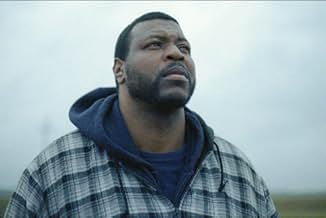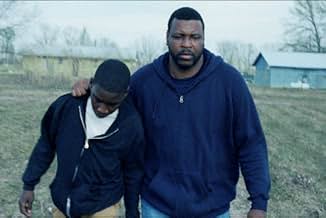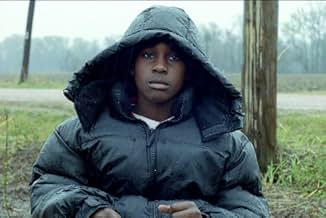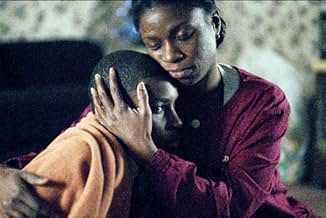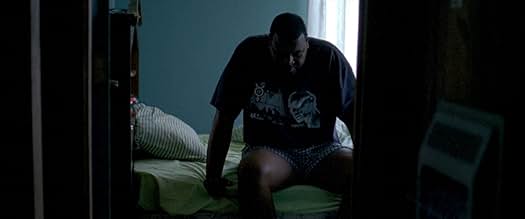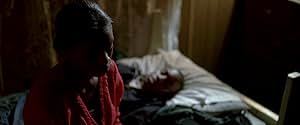AVALIAÇÃO DA IMDb
6,9/10
2,5 mil
SUA AVALIAÇÃO
Adicionar um enredo no seu idiomaA drama set in the Mississippi delta, where one man's suicide affects three people's lives.A drama set in the Mississippi delta, where one man's suicide affects three people's lives.A drama set in the Mississippi delta, where one man's suicide affects three people's lives.
- Prêmios
- 17 vitórias e 21 indicações no total
Neil Pettigrew
- Dispatcher
- (narração)
Sanjib Shrestha
- Dr. Shrestha
- (as Dr. Sanjib Shrestha)
Avaliações em destaque
I took a while to trust this film, since it is one of many new indies to start very slowly, with much that is unexplained and not only minimal sound effects, but in fact even minimal ambient sound. There's a number of new films that start this way and never get anywhere after that. Here however there's a slow but inevitable build, and much of what's unexplained becomes intuitively clear as the film progresses. The uncle's first few encounters with his nephew are beautifully set up and played, with their undercurrents clear early on. The story at one point becomes a bit predictable, but nonetheless engaging. The characters are very rich without any surface effort or telegraphing. I'm iffy on the ending, and I don't know that I'd want to watch a number of films like this in a row. But it has definite authority, and shows immense promise.
I first became interested in Ballast when I heard about its setting: it's very rare to find a film set in the Mississippi Delta. It's also quite rare to find a serious drama with mostly black characters. I was afraid that this would either be a sappy melodrama or an attempt to make some "profound" point about how racism exists and is, like, bad and stuff. Thus I was quite pleased to find that this film manages to have a uniquely Southern setting without resorting to clichés or caricatures and that making some grand social statement is evidently the last thing on the mind of first time director Lance Hammer. Instead, we have a deliberately paced character study with a nicely handled mise en scene.
The film opens with the attempted suicide of Lawrence, a shopkeeper distressed over the (extremely) recent death of his twin brother/partner/only friend. Lawrence's recovery is complicated by his brother's will which indicates that the recently deceased man's ex-wife and teenage son are entitled to his share of the store and part of the property the brothers had co-habitated. Things start off tense due to the boy's involvement with some disreputable older boys that he owes money and stay that way due to Lawrence's troubled partnership with the boy's mother. This is a quiet, contemplative film for the most part and it offers no easy resolutions. Instead, it manages to realistically capture some unique characters in a woefully ignored section of American society.
The film opens with the attempted suicide of Lawrence, a shopkeeper distressed over the (extremely) recent death of his twin brother/partner/only friend. Lawrence's recovery is complicated by his brother's will which indicates that the recently deceased man's ex-wife and teenage son are entitled to his share of the store and part of the property the brothers had co-habitated. Things start off tense due to the boy's involvement with some disreputable older boys that he owes money and stay that way due to Lawrence's troubled partnership with the boy's mother. This is a quiet, contemplative film for the most part and it offers no easy resolutions. Instead, it manages to realistically capture some unique characters in a woefully ignored section of American society.
Winner of cinematography and director awards at the Sundance Film Festival and nominated for the Jury Prize at Sundance and Berlin, Lance Hammer's Ballast is an American original. Performed by non-professional actors and shot with a hand-held camera, the film looks at the lives of three distraught people in the Mississippi Delta, conveying with passion their ability to discover their own humanity and transcend the circumstances of their life. Using only the ambient sounds of nature, and portraying events in an elliptical manner that forces us to fill in the blanks, Ballast is reminiscent of the minimalist masterpieces of the Dardennes' and Charles Burnett, but has a unique rhythm all its own.
Shot on 35 mm along the Mississippi Delta, it is a film that quickly establishes mood and suspense and creates an emotional range that travels from anger and sadness to hope and joy. As the film opens, 12 year-old James (JimMyron Ross) chases a flock of birds in an open cotton field during the winter. The camera then shifts to a distraught man, Lawrence (Michael J. Smith, Sr.) sitting alone in his living room in the house next to his sister-in-law, Marlee (Tarra Riggs). The man is paralyzed with depression and unable to communicate due to the death of his brother Darius who, as discovered by a neighbor John (Johnny McPhail), has died in his bed of a self-inflicted overdose. Sullenly, Lawrence responds to the tragedy by going outside and shooting himself in the lungs. Rushed to the hospital, he is badly wounded but recovers after several weeks in the hospital.
In trouble with dope dealers, young James keeps his working mother from discovering that he owes $100 for crack cocaine, but it is revealed when James' TV is taken by the gang and both mother and son are assaulted in their cars. James, who owns a scooter, rides to Lawrence's place and demands his father's money at gunpoint. Things seem to hit rock bottom when Marlee is fired from her job cleaning toilets and Lawrence, still in shock, is unable to reopen his small food market. With nowhere to go but up, the three begin a long process of discovery of their indelible connection to life and to each other.
Unfolding like a documentary, Ballast conveys a sense of immediacy and a lyricism that gathers momentum as the film progresses. Accents are difficult to fathom (the film wisely provides English subtitles), yet there is a naturalism and authenticity here that keeps us engaged throughout. While none of the actors have ever acted before, you would not know it from the power of their performances, especially from Tarra Riggs and young Ross. It is a film, however, that definitely requires patience from the viewer. There are no markers to tell us what we are supposed to feel about the people we see on the screen, yet we remain tuned in to their struggles as if they were our own and in many respects they are. As they discover that who they are is larger than their circumstances, we discover a similar truth in our own life.
Shot on 35 mm along the Mississippi Delta, it is a film that quickly establishes mood and suspense and creates an emotional range that travels from anger and sadness to hope and joy. As the film opens, 12 year-old James (JimMyron Ross) chases a flock of birds in an open cotton field during the winter. The camera then shifts to a distraught man, Lawrence (Michael J. Smith, Sr.) sitting alone in his living room in the house next to his sister-in-law, Marlee (Tarra Riggs). The man is paralyzed with depression and unable to communicate due to the death of his brother Darius who, as discovered by a neighbor John (Johnny McPhail), has died in his bed of a self-inflicted overdose. Sullenly, Lawrence responds to the tragedy by going outside and shooting himself in the lungs. Rushed to the hospital, he is badly wounded but recovers after several weeks in the hospital.
In trouble with dope dealers, young James keeps his working mother from discovering that he owes $100 for crack cocaine, but it is revealed when James' TV is taken by the gang and both mother and son are assaulted in their cars. James, who owns a scooter, rides to Lawrence's place and demands his father's money at gunpoint. Things seem to hit rock bottom when Marlee is fired from her job cleaning toilets and Lawrence, still in shock, is unable to reopen his small food market. With nowhere to go but up, the three begin a long process of discovery of their indelible connection to life and to each other.
Unfolding like a documentary, Ballast conveys a sense of immediacy and a lyricism that gathers momentum as the film progresses. Accents are difficult to fathom (the film wisely provides English subtitles), yet there is a naturalism and authenticity here that keeps us engaged throughout. While none of the actors have ever acted before, you would not know it from the power of their performances, especially from Tarra Riggs and young Ross. It is a film, however, that definitely requires patience from the viewer. There are no markers to tell us what we are supposed to feel about the people we see on the screen, yet we remain tuned in to their struggles as if they were our own and in many respects they are. As they discover that who they are is larger than their circumstances, we discover a similar truth in our own life.
This is very much a modern American drama. Though issues such as drugs, gangs, broken family relations, violent poorly managed schools, unemployment, and financial breakdowns play a role in steering the lives of the principal characters, the primary emotion is sorrow. The suicide of a twin brother is the trigger that brings three characters -- the brother of the victim, the ex-wife and son -- to clash.
Given the fine performances of the three principals and the supporting cast, it is hard to believe that those roles are played by non-professionals. The director picked them from the local population, deep in the Mississippi Delta. Certainly there is talent here, the woman especially. But credit is due to the director who expertly calibrated the acting, mixing the right doses of melancholy, anger and disappointment. The same can be said of the environment. The wintry landscape with its scattered naked trees, resting agricultural land, and gray skies add to a sense of continual sadness.
Thankfully the director spared us from a musical track. The sounds are natural. The light as much. The plot linear. The Dogma rulebook applied.
The end is abrupt. The beginning is almost as abrupt. The past can be guessed. The future is an open question as it carries conflicting emotions. How you choose to continue the story in your mind depends on whether you are an optimist or a pessimist.
Given the fine performances of the three principals and the supporting cast, it is hard to believe that those roles are played by non-professionals. The director picked them from the local population, deep in the Mississippi Delta. Certainly there is talent here, the woman especially. But credit is due to the director who expertly calibrated the acting, mixing the right doses of melancholy, anger and disappointment. The same can be said of the environment. The wintry landscape with its scattered naked trees, resting agricultural land, and gray skies add to a sense of continual sadness.
Thankfully the director spared us from a musical track. The sounds are natural. The light as much. The plot linear. The Dogma rulebook applied.
The end is abrupt. The beginning is almost as abrupt. The past can be guessed. The future is an open question as it carries conflicting emotions. How you choose to continue the story in your mind depends on whether you are an optimist or a pessimist.
We saw this at Sundance 2008, and found it to be deliberately slow, but also quite thoughtful as it told the story of a man whose twin brother's suicide devastates him. The story extends to the dead man's ex wife and son and explores the aftermath of the suicide and its effects on these three characters. What makes this film impressive is that the actors involved in almost every role had never acted before. The director revealed to us at the Q&A session that he had gone to churches in the Mississippi Delta and recruited people to be in his film. Also notable is the sound, or lack thereof. Instead of a busy, noisy soundtrack, this was a quiet film with very little music, relying instead on the ambient noise of the area in which it was filmed. We enjoyed the film and wish the director and the actors much success.
Você sabia?
- CuriosidadesMicheal J. Smith Sr. (who plays Lawrence) had to be persuaded to make the film as he had no interest in such things. In real life, he works for the Public Services Commission in Yazoo City, Mississippi and was discovered attending his local church.
- ConexõesReferenced in Film Junk Podcast: Episode 245: Fantastic Mr. Fox (2009)
- Trilhas sonorasI'll Wait For Jesus
Traditional
Arranged by Clora T. Handy & Ann Nichols
Performed by The Canton Gospel Chorus
Courtesy of Talk of the Town Records
Principais escolhas
Faça login para avaliar e ver a lista de recomendações personalizadas
Detalhes
Bilheteria
- Orçamento
- US$ 700.000 (estimativa)
- Faturamento bruto nos EUA e Canadá
- US$ 77.556
- Fim de semana de estreia nos EUA e Canadá
- US$ 8.572
- 5 de out. de 2008
- Faturamento bruto mundial
- US$ 81.864
- Tempo de duração
- 1 h 36 min(96 min)
- Cor
- Mixagem de som
- Proporção
- 2.35 : 1
Contribua para esta página
Sugerir uma alteração ou adicionar conteúdo ausente


